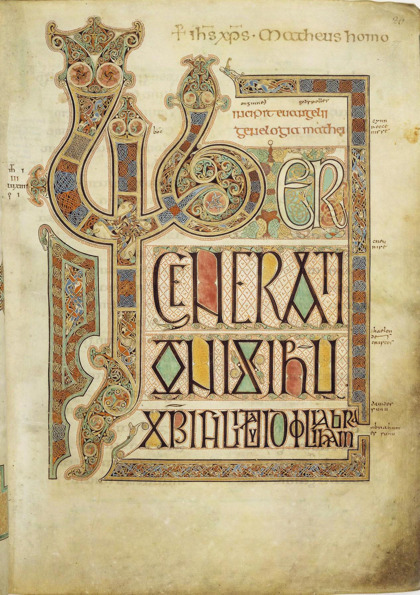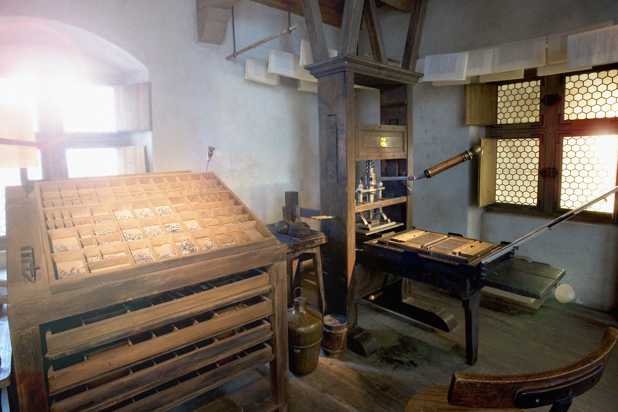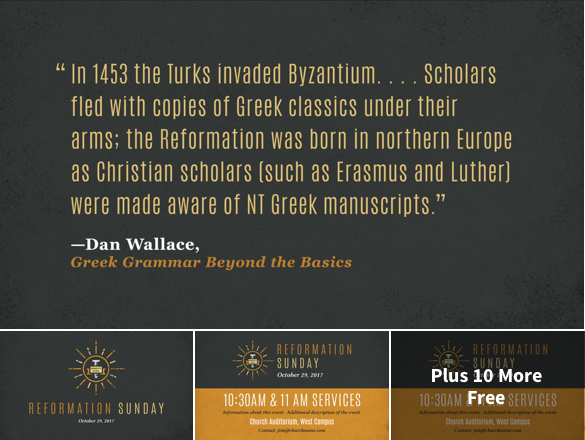 Reformation 500
Reformation 500
Still Standing
How the preservation and publication of Scripture made the Reformation possible.
A.D. 300
Watch this exclusive clip from the new
Faithlife original film Fragments of Truth.
A New Invention Changes
the World
The earliest Christians turned to a new technology to record God’s Word. It was called the codex—what we know today as the book. By A.D. 300 the codex was even more popular than the scroll, a change that would enable future movements like the Reformation to flourish.
Be the first to hear when Fragments of Truth is released. Sign up for updates, news, and more.
 Learn more
Learn more
The Canon &
the Scribes
The Reformers would call the church “back to the sources”—early biblical manuscripts in Greek and Hebrew. But that may not have even been possible if it wasn’t for two key events in the early centuries of the church: the formal recognition of the canon at church councils like the one held in Nicaea in A.D. 325, and the scrupulous attention of Christian scribes.
Discover more video lectures on the Reformation in the Logos Mobile Education Lecture Hall.
 Explore Reformation videos
Explore Reformation videos
A.D. 700

The Lindisfarne Gospels
Scribes didn’t just copy the Greek and Hebrew, they also preserved Bible translations. The Lindisfarne Gospels, created in A.D. 700, is one such text: a beautiful, illuminated manuscript of the four Gospels in Latin. Over time Latin lost its dominance, but the Latin Vulgate remained the official Bible of the Church—and the only version of Scripture widely available in Europe.
A.D. 1380
The Morningstar Rises
By the late-fourteenth century, the Word of God was available to only an elite few, and in a language the common people could neither read nor speak. As scandals ravaged the church, a man named John Wycliffe became convinced: reform was only possible if the common people could read God’s Word in their own language. By 1384, his translation was complete.
Watch the complete documentary on Faithlife TV.
 Watch now
Watch now
A.D. 1440

Gutenberg’s Revolutionary Invention
If the posting of Luther’s theses didn’t launch the Reformation, their publication did. That was only possible thanks to a relatively new invention by an obscure goldsmith named Johannes Gutenberg. He created the printing press, and his first major printed work was, naturally, a Bible.
A.D. 1453

Collapse of the Byzantine Empire
When Byzantium fell to the Ottomans, the great Orthodox church Hagia Sophia became an imperial mosque—and Christian scholars fled to Europe. They brought with them a knowledge of the Greek language. Thanks in part to their expertise, the Reformers could study the New Testament in its original language and, ultimately, translate it into the common tongue.
Create your own quote slides with a free media pack.
 Get free media
Get free media
A.D. 1516
The Race to Publish the Greek New Testament
The first printed Greek New Testament was called the Complutensian Polyglot, a beautiful parallel Bible containing numerous scriptural texts. But copies spent eight years in a warehouse waiting for the pope’s permission to publish. This gave Erasmus a window of opportunity: he published his own version. It became the first published Greek New Testament—and the basis for the Bible translations of the Reformation era.
Build your own parallel Bible right now for free with the Logos web app.
 Launch the web app
Launch the web app
A.D. 1517

Martin Luther Revolutionizes Bible Study
It was only after Luther read the Bible in its original languages (rather than Latin) that he came by his world-changing Reformation insights. And by translating the Bible into German he made God’s Word available to common people, too.
Discover how Martin Luther revolutionized Bible study in this article from Faithlife’s Bible Study Magazine.
 Read the article
Read the article
The Authorized Version & the Bible Translation Boom
The Reformers emphasized the biblical teaching that all Christians are priests before God. The King James Version, and many other Bibles from the same era, made Scripture available in the languages Christians spoke and read—not just Latin. After all, if we’re all priests, shouldn’t we be able to read and understand God’s Word?
Get Authorized: The Use & Misuse of the King James Version, the new book from Faithlife’s publishing imprint, Lexham Press.
 Get it now
Get it now